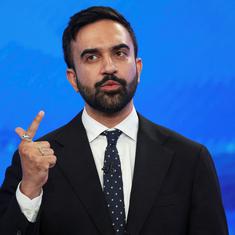Last fortnight, Prasanna Acharya, the deputy leader of the opposition Biju Janata Dal party, demanded that Odisha make Kosali the state’s second language and campaign for it to be included in the Eighth Schedule of the Indian Constitution. This schedule lists the languages officially recognised by the Indian government.
Acharya’s remarks followed a declaration early in March by Jayanarayan Mishra, an MLA of the ruling Bharatiya Janata Party, who embarrassed his party by declaring that it had been a “historical mistake” for the western Koshal region – where Kosali is spoken – to be incorporated into the state of Odisha.
“We have been exploited in every sphere … mining, agriculture, forest and service,” he said. “We have been denied our cultural rights. The integration of Koshal with Odisha was a historic blunder.”
These statements have drawn attention to the identity politics in the backward Koshal region and the demands that it be separated it from the coastal part of the state.
The campaign for a separate state is the result of regional disparities and political power being skewed towards residents of the coastal region, said Supreme Court lawyer and Koshal sympathiser Gyanadutta Chouhan.
In some districts of the inland region, more than 60% of residents live below the poverty line.
“The youth of the region are conscious about their identity and feel they are unemployed and forced to be distress-migrant labourers to other states due to the over-exploitation and dominance of coastal people,” he said.
On April 1, Koshal activists had threatened to observe Odisha Divas as Black Day. The police arrested more than 100 people, said Chouhan.
Koshal or Koshanchal comprises 10 districts in western Odisha – Sambalpur, Jharsuguda, Sundargarh, Bargarh, Kalahandi, Nuapada, Deogarh, Sonepur, Boudh and Balangir.
Kosali is the mother tongue of more than 7.5 million people in Western Odisha.

Odisha was formed in 1936 as India’s first linguistic province. But the Koshal region became part of Odisha only after Independence, when the rulers of princely states acceded to the Indian Union.
During my field study in Sambalpur in the 2024 assembly election, Koshal activists said that the Odia-speaking coastal people were discriminating against them linguistically. Just like Bengalis had once discriminated against people from the province by claiming that Odia is not a language, these activists said that Odias were now asking whether Kosali is a language.
They pointed out that Kosali had a rich literary tradition. For instance, Charyapada, a mystical Vajrayana Buddhism poem written in Bengali, Assamese and Koshli, dates back to 1200 CE, they noted.
The current Koshal movement echoes a historical agitation for statehood in the 1950s.
At that time, the Gantantra Parishad, a political party led by princes from western Odisha, invoked resentment against coastal areas. Koshal politics was also given a fillip by the movements against the displacements that would result from the construction of the Hirakud dam and Rourkela steel plant in this region. The Gantantra Parishad supported these agitations.
However, after Ganatantra Parishad in 1962 merged with the Swatantra Party, a right-wing organisation led by princes, it lost its political momentum.
The demand for Koshal state was resurrected in the 1990s by Prem Ram Dubey, a lawyer from Sambalpur, and Balgopal Mishra, a BJP legislator from Saintala Balangir.
Dubey said that despite the region having a glorious past, it had been neglected because it had merged with Odisha. He published a newspaper called Koshal Khabara and mobilised an organisation called the Koshal Sena to press for statehood.
Balgopla Mishra first made the demand for Koshal state in the 1990s and, in 2004, launched an outfit called the Koshal Mukti Ratha. Similarly, in 2007, a lawyer named Pramod Mishra founded a political party called Koshal Kranti Dal to fight against the “internal colonialism” of coastal Odisha.
“The language and culture of the western region are different,” Pramod Mishra has said. “The western region has been facing apathy from the rulers, which only strengthened the demand for a separate Koshal state.”
The agitation gained substantial momentum in 2013 as it drew inspiration when Andhra Pradesh was bifurcated to create the state of Telangana. In August that year, college students in the Koshal area participated in a rail blockade to press for this demand.
Among the organisations now pushing for a separate Koshal state are the Koshal Kranti Dal, Koshli Ekta Manch, Koshal Rajya Sangharsha Samiti, Veer Surendra Sai Manch and the All Koshal Students Union.
When the ruling Bharatiya Janata Party came to power in 2024, it claimed that it would restore Odia Asmita or Odiya pride. The Hindutva party receives a significant share of votes from western Odisha so allegations that it has neglected the Koshal region may extract a political cost.
Ganesh Gaigouria is a PhD candidate at the Centre for Political Studies, School of Social Sciences, Jawaharlal Nehru University, New Delhi. He is writing his thesis on Emotions, Politics and Identity: Analysing Anger in Everyday Dalit Resistance.










